- Home
- P. G. Wodehouse
The Man with Two Left Feet, and Other Stories Page 10
The Man with Two Left Feet, and Other Stories Read online
Page 10
BLACK FOR LUCK
He was black, but comely. Obviously in reduced circumstances, he hadnevertheless contrived to retain a certain smartness, a certainair--what the French call the _tournure_. Nor had poverty killedin him the aristocrat's instinct of personal cleanliness; for even asElizabeth caught sight of him he began to wash himself.
At the sound of her step he looked up. He did not move, but there wassuspicion in his attitude. The muscles of his back contracted, his eyesglowed like yellow lamps against black velvet, his tail switched alittle, warningly.
Elizabeth looked at him. He looked at Elizabeth. There was a pause,while he summed her up. Then he stalked towards her, and, suddenlylowering his head, drove it vigorously against her dress. He permittedher to pick him up and carry him into the hall-way, where Francis, thejanitor, stood.
'Francis,' said Elizabeth, 'does this cat belong to anyone here?'
'No, miss. That cat's a stray, that cat is. I been trying to locatethat cat's owner for days.'
Francis spent his time trying to locate things. It was the onerecreation of his eventless life. Sometimes it was a noise, sometimes alost letter, sometimes a piece of ice which had gone astray in thedumb-waiter--whatever it was, Francis tried to locate it.
'Has he been round here long, then?'
'I seen him snooping about a considerable time.'
'I shall keep him.'
'Black cats bring luck,' said Francis sententiously.
'I certainly shan't object to that,' said Elizabeth. She was feelingthat morning that a little luck would be a pleasing novelty. Things hadnot been going very well with her of late. It was not so much that theusual proportion of her manuscripts had come back with editorialcompliments from the magazine to which they had been sent--she acceptedthat as part of the game; what she did consider scurvy treatment at thehands of fate was the fact that her own pet magazine, the one to whichshe had been accustomed to fly for refuge, almost sure of awelcome--when coldly treated by all the others--had suddenly expiredwith a low gurgle for want of public support. It was like losing a kindand open-handed relative, and it made the addition of a black cat tothe household almost a necessity.
In her flat, the door closed, she watched her new ally with someanxiety. He had behaved admirably on the journey upstairs, but shewould not have been surprised, though it would have pained her, if hehad now proceeded to try to escape through the ceiling. Cats were soemotional. However, he remained calm, and, after padding silently aboutthe room for awhile, raised his head and uttered a crooning cry.
'That's right,' said Elizabeth, cordially. 'If you don't see what youwant, ask for it. The place is yours.'
She went to the ice-box, and produced milk and sardines. There wasnothing finicky or affected about her guest. He was a good trencherman,and he did not care who knew it. He concentrated himself on therestoration of his tissues with the purposeful air of one whose lastmeal is a dim memory. Elizabeth, brooding over him like a Providence,wrinkled her forehead in thought.
'Joseph,' she said at last, brightening; 'that's your name. Now settledown, and start being a mascot.'
Joseph settled down amazingly. By the end of the second day he wasconveying the impression that he was the real owner of the apartment,and that it was due to his good nature that Elizabeth was allowed therun of the place. Like most of his species, he was an autocrat. Hewaited a day to ascertain which was Elizabeth's favourite chair, thenappropriated it for his own. If Elizabeth closed a door while he was ina room, he wanted it opened so that he might go out; if she closed itwhile he was outside, he wanted it opened so that he might come in; ifshe left it open, he fussed about the draught. But the best of us haveour faults, and Elizabeth adored him in spite of his.
It was astonishing what a difference he made in her life. She was afriendly soul, and until Joseph's arrival she had had to depend forcompany mainly on the footsteps of the man in the flat across the way.Moreover, the building was an old one, and it creaked at night. Therewas a loose board in the passage which made burglar noises in the darkbehind you when you stepped on it on the way to bed; and there werefunny scratching sounds which made you jump and hold your breath.Joseph soon put a stop to all that. With Joseph around, a loose boardbecame a loose board, nothing more, and a scratching noise just a plainscratching noise.
And then one afternoon he disappeared.
Having searched the flat without finding him, Elizabeth went to thewindow, with the intention of making a bird's-eye survey of the street.She was not hopeful, for she had just come from the street, and therehad been no sign of him then.
Outside the window was a broad ledge, running the width of thebuilding. It terminated on the left, in a shallow balcony belonging tothe flat whose front door faced hers--the flat of the young man whosefootsteps she sometimes heard. She knew he was a young man, becauseFrancis had told her so. His name, James Renshaw Boyd, she had learnedfrom the same source.
On this shallow balcony, licking his fur with the tip of a crimsontongue and generally behaving as if he were in his own backyard, satJoseph.
'Jo-seph!' cried Elizabeth--surprise, joy, and reproach combining togive her voice an almost melodramatic quiver.
He looked at her coldly. Worse, he looked at her as if she had been anutter stranger. Bulging with her meat and drink, he cut her dead; and,having done so, turned and walked into the next flat.
Elizabeth was a girl of spirit. Joseph might look at her as if she werea saucerful of tainted milk, but he was her cat, and she meant to gethim back. She went out and rang the bell of Mr James Renshaw Boyd'sflat.
The door was opened by a shirt-sleeved young man. He was by no means anunsightly young man. Indeed, of his type--the rough-haired,clean-shaven, square-jawed type--he was a distinctly good-looking youngman. Even though she was regarding him at the moment purely in thelight of a machine for returning strayed cats, Elizabeth noticed that.
She smiled upon him. It was not the fault of this nice-looking youngman that his sitting-room window was open; or that Joseph was anungrateful little beast who should have no fish that night.
'Would you mind letting me have my cat, please?' she said pleasantly.'He has gone into your sitting-room through the window.'
He looked faintly surprised.
'Your cat?'
'My black cat, Joseph. He is in your sitting-room.'
'I'm afraid you have come to the wrong place. I've just left mysitting-room, and the only cat there is my black cat, Reginald.'
'But I saw Joseph go in only a minute ago.'
'That was Reginald.'
For the first time, as one who examining a fair shrub abruptlydiscovers that it is a stinging-nettle, Elizabeth realized the truth.This was no innocent young man who stood before her, but the blackestcriminal known to criminologists--a stealer of other people's cats. Hermanner shot down to zero.
'May I ask how long you have had your Reginald?'
'Since four o'clock this afternoon.'
'Did he come in through the window?'
'Why, yes. Now you mention it, he did.'
'I must ask you to be good enough to give me back my cat,' saidElizabeth, icily.
He regarded her defensively.
'Assuming,' he said, 'purely for the purposes of academic argument,that your Joseph is my Reginald, couldn't we come to an agreement ofsome sort? Let me buy you another cat. A dozen cats.'
'I don't want a dozen cats. I want Joseph.'
'Fine, fat, soft cats,' he went on persuasively. 'Lovely, affectionatePersians and Angoras, and--'
'Of course, if you intend to steal Joseph--'
'These are harsh words. Any lawyer will tell you that there are specialstatutes regarding cats. To retain a stray cat is not a tort or amisdemeanour. In the celebrated test-case of Wiggins _v_. Bluebodyit was established--'
'Will you please give me back my cat?'
She stood facing him, her chin in the air and her eyes shining, and theyoung man suddenly fell a victim to conscience.
&nb
sp; 'Look here,' he said, 'I'll throw myself on your mercy. I admit the catis your cat, and that I have no right to it, and that I am just acommon sneak-thief. But consider. I had just come back from the firstrehearsal of my first play; and as I walked in at the door that catwalked in at the window. I'm as superstitious as a coon, and I feltthat to give him up would be equivalent to killing the play before everit was produced. I know it will sound absurd to you. _You_ have noidiotic superstitions. You are sane and practical. But, in thecircumstances, if you _could_ see your way to waiving yourrights--'
Before the wistfulness of his eye Elizabeth capitulated. She felt quiteovercome by the revulsion of feeling which swept through her. How shehad misjudged him! She had taken him for an ordinary soulless purloinerof cats, a snapper-up of cats at random and without reason; and all thetime he had been reluctantly compelled to the act by this deep andpraiseworthy motive. All the unselfishness and love of sacrifice innatein good women stirred within her.
'Why, of _course_ you mustn't let him go! It would mean awful badluck.'
'But how about you--'
'Never mind about me. Think of all the people who are dependent on yourplay being a success.'
The young man blinked.
'This is overwhelming,' he said.
'I had no notion why you wanted him. He was nothing to me--at least,nothing much--that is to say--well, I suppose I was rather fond ofhim--but he was not--not--'
'Vital?'
'That's just the word I wanted. He was just company, you know.'
'Haven't you many friends?'
'I haven't any friends.'
'You haven't any friends! That settles it. You must take him back.'
'I couldn't think of it.'
'Of course you must take him back at once.'
'I really couldn't.'
'You must.'
'I won't.'
'But, good gracious, how do you suppose I should feel, knowing that youwere all alone and that I had sneaked your--your ewe lamb, as it were?'
'And how do you suppose I should feel if your play failed simply forlack of a black cat?'
He started, and ran his fingers through his rough hair in anoverwrought manner.
'Solomon couldn't have solved this problem,' he said. 'How would itbe--it seems the only possible way out--if you were to retain a sort ofmanagerial right in him? Couldn't you sometimes step across and chatwith him--and me, incidentally--over here? I'm very nearly as lonesomeas you are. Chicago is my home. I hardly know a soul in New York.'
Her solitary life in the big city had forced upon Elizabeth the abilityto form instantaneous judgements on the men she met. She flashed aglance at the young man and decided in his favour.
'It's very kind of you,' she said. 'I should love to. I want to hearall about your play. I write myself, you know, in a very small way, soa successful playwright is Someone to me.'
'I wish I were a successful playwright.'
'Well, you are having the first play you have ever written produced onBroadway. That's pretty wonderful.'
''M--yes,' said the young man. It seemed to Elizabeth that he spokedoubtfully, and this modesty consolidated the favourable impression shehad formed.
* * * * *
The gods are just. For every ill which they inflict they also supply acompensation. It seems good to them that individuals in big citiesshall be lonely, but they have so arranged that, if one of theseindividuals does at last contrive to seek out and form a friendshipwith another, that friendship shall grow more swiftly than the tepidacquaintanceships of those on whom the icy touch of loneliness hasnever fallen. Within a week Elizabeth was feeling that she had knownthis James Renshaw Boyd all her life.
And yet there was a tantalizing incompleteness about his personalreminiscences. Elizabeth was one of those persons who like to begin afriendship with a full statement of their position, their previouslife, and the causes which led up to their being in this particularspot at this particular time. At their next meeting, before he had hadtime to say much on his own account, she had told him of her life inthe small Canadian town where she had passed the early part of herlife; of the rich and unexpected aunt who had sent her to college forno particular reason that anyone could ascertain except that sheenjoyed being unexpected; of the legacy from this same aunt, farsmaller than might have been hoped for, but sufficient to send agrateful Elizabeth to New York, to try her luck there; of editors,magazines, manuscripts refused or accepted, plots for stories; of lifein general, as lived down where the Arch spans Fifth Avenue and thelighted cross of the Judson shines by night on Washington Square.
Ceasing eventually, she waited for him to begin; and he did notbegin--not, that is to say, in the sense the word conveyed toElizabeth. He spoke briefly of college, still more briefly ofChicago--which city he appeared to regard with a distaste that madeLot's attitude towards the Cities of the Plain almost kindly bycomparison. Then, as if he had fulfilled the demands of the mostexacting inquisitor in the matter of personal reminiscence, he began tospeak of the play.
The only facts concerning him to which Elizabeth could really havesworn with a clear conscience at the end of the second week of theiracquaintance were that he was very poor, and that this play meanteverything to him.
The statement that it meant everything to him insinuated itself sofrequently into his conversation that it weighed on Elizabeth's mindlike a burden, and by degrees she found herself giving the play placeof honour in her thoughts over and above her own little ventures. Withthis stupendous thing hanging in the balance, it seemed almost wickedof her to devote a moment to wondering whether the editor of an eveningpaper, who had half promised to give her the entrancing post of Adviserto the Lovelorn on his journal, would fulfil that half-promise.
At an early stage in their friendship the young man had told her theplot of the piece; and if he had not unfortunately forgotten severalimportant episodes and had to leap back to them across a gulf of one ortwo acts, and if he had referred to his characters by name instead ofby such descriptions as 'the fellow who's in love with the girl--notwhat's-his-name but the other chap'--she would no doubt have got thatmental half-Nelson on it which is such a help towards the properunderstanding of a four-act comedy. As it was, his precis had left hera little vague; but she said it was perfectly splendid, and he said didshe really think so. And she said yes, she did, and they were bothhappy.
Rehearsals seemed to prey on his spirits a good deal. He attended themwith the pathetic regularity of the young dramatist, but they appearedto bring him little balm. Elizabeth generally found him steeped ingloom, and then she would postpone the recital, to which she had beenlooking forward, of whatever little triumph she might have happened towin, and devote herself to the task of cheering him up. If women werewonderful in no other way, they would be wonderful for their genius forlistening to shop instead of talking it.
Elizabeth was feeling more than a little proud of the way in which herjudgement of this young man was being justified. Life in Bohemian NewYork had left her decidedly wary of strange young men, not formallyintroduced; her faith in human nature had had to undergo muchstraining. Wolves in sheep's clothing were common objects of thewayside in her unprotected life; and perhaps her chief reason forappreciating this friendship was the feeling of safety which it gaveher.
Their relations, she told herself, were so splendidly unsentimental.There was no need for that silent defensiveness which had come to seemalmost an inevitable accompaniment to dealings with the opposite sex.James Boyd, she felt, she could trust; and it was wonderful howsoothing the reflexion was.
And that was why, when the thing happened, it so shocked and frightenedher.
It had been one of their quiet evenings. Of late they had fallen intothe habit of sitting for long periods together without speaking. But ithad differed from other quiet evenings through the fact thatElizabeth's silence hid a slight but well-defined feeling of injury.Usually she sat happy with her thoughts, but tonight she was ruffle
d.She had a grievance.
That afternoon the editor of the evening paper, whose angelic statusnot even a bald head and an absence of wings and harp could conceal,had definitely informed her that the man who had conducted the columnhitherto having resigned, the post of Heloise Milton, official adviserto readers troubled with affairs of the heart, was hers; and he lookedto her to justify the daring experiment of letting a woman handle soresponsible a job. Imagine how Napoleon felt after Austerlitz, pictureColonel Goethale contemplating the last spadeful of dirt from thePanama Canal, try to visualize a suburban householder who sees a floweremerging from the soil in which he has inserted a packet of guaranteedseeds, and you will have some faint conception how Elizabeth felt asthose golden words proceeded from that editor's lips. For the momentAmbition was sated. The years, rolling by, might perchance open outother vistas; but for the moment she was content.
Into James Boyd's apartment she had walked, stepping on fleecy cloudsof rapture, to tell him the great news.
She told him the great news.
He said, 'Ah!'
There are many ways of saying 'Ah!' You can put joy, amazement, raptureinto it; you can also make it sound as if it were a reply to a remarkon the weather. James Boyd made it sound just like that. His hair wasrumpled, his brow contracted, and his manner absent. The impression hegave Elizabeth was that he had barely heard her. The next moment he wasdeep in a recital of the misdemeanours of the actors now rehearsing forhis four-act comedy. The star had done this, the leading woman that,the juvenile something else. For the first time Elizabeth listenedunsympathetically.
The time came when speech failed James Boyd, and he sat back in hischair, brooding. Elizabeth, cross and wounded, sat in hers, nursingJoseph. And so, in a dim light, time flowed by.
Just how it happened she never knew. One moment, peace; the next chaos.One moment stillness; the next, Joseph hurtling through the air, allclaws and expletives, and herself caught in a clasp which shook thebreath from her.
One can dimly reconstruct James's train of thought. He is in despair;things are going badly at the theatre, and life has lost its savour.His eye, as he sits, is caught by Elizabeth's profile. It is apretty--above all, a soothing--profile. An almost painfulsentimentality sweeps over James Boyd. There she sits, his only friendin this cruel city. If you argue that there is no necessity to springat your only friend and nearly choke her, you argue soundly; the pointis well taken. But James Boyd was beyond the reach of sound argument.Much rehearsing had frayed his nerves to ribbons. One may say that hewas not responsible for his actions.
That is the case for James. Elizabeth, naturally, was not in a positionto take a wide and understanding view of it. All she knew was that Jameshad played her false, abused her trust in him. For a moment, such wasthe shock of the surprise, she was not conscious of indignation--or,indeed, of any sensation except the purely physical one ofsemi-strangulation. Then, flushed, and more bitterly angry than shecould ever have imagined herself capable of being, she began tostruggle. She tore herself away from him. Coming on top of hergrievance, this thing filled her with a sudden, very vivid hatred ofJames. At the back of her anger, feeding it, was the humiliatingthought that it was all her own fault, that by her presence there shehad invited this.
She groped her way to the door. Something was writhing and strugglinginside her, blinding her eyes, and robbing her of speech. She was onlyconscious of a desire to be alone, to be back and safe in her own home.She was aware that he was speaking, but the words did not reach her.She found the door, and pulled it open. She felt a hand on her arm, butshe shook it off. And then she was back behind her own door, alone andat liberty to contemplate at leisure the ruins of that little temple offriendship which she had built up so carefully and in which she hadbeen so happy.
The broad fact that she would never forgive him was for a while heronly coherent thought. To this succeeded the determination that shewould never forgive herself. And having thus placed beyond the pale theonly two friends she had in New York, she was free to devote herselfwithout hindrance to the task of feeling thoroughly lonely andwretched.
The shadows deepened. Across the street a sort of bubbling explosion,followed by a jerky glare that shot athwart the room, announced thelighting of the big arc-lamp on the opposite side-walk. She resentedit, being in the mood for undiluted gloom; but she had not the energyto pull down the shade and shut it out. She sat where she was, thinkingthoughts that hurt.
The door of the apartment opposite opened. There was a single ring ather bell. She did not answer it. There came another. She sat where shewas, motionless. The door closed again.
* * * * *
The days dragged by. Elizabeth lost count of time. Each day had itsduties, which ended when you went to bed; that was all she knew--exceptthat life had become very grey and very lonely, far lonelier even thanin the time when James Boyd was nothing to her but an occasional soundof footsteps.
Of James she saw nothing. It is not difficult to avoid anyone in NewYork, even when you live just across the way.
* * * * *
It was Elizabeth's first act each morning, immediately on awaking, toopen her front door and gather in whatever lay outside it. Sometimesthere would be mail; and always, unless Francis, as he sometimes did,got mixed and absent-minded, the morning milk and the morning paper.
One morning, some two weeks after that evening of which she tried notto think, Elizabeth, opening the door, found immediately outside it afolded scrap of paper. She unfolded it.
_I am just off to the theatre. Won't you wish me luck? I feel sure it is going to be a hit. Joseph is purring like a dynamo._--J.R.B.
In the early morning the brain works sluggishly. For an instantElizabeth stood looking at the words uncomprehendingly; then, with aleaping of the heart, their meaning came home to her. He must have leftthis at her door on the previous night. The play had been produced! Andsomewhere in the folded interior of the morning paper at her feet mustbe the opinion of 'One in Authority' concerning it!
Dramatic criticisms have this peculiarity, that if you are looking forthem, they burrow and hide like rabbits. They dodge behind murders;they duck behind baseball scores; they lie up snugly behind the WallStreet news. It was a full minute before Elizabeth found what shesought, and the first words she read smote her like a blow.
In that vein of delightful facetiousness which so endears him to allfollowers and perpetrators of the drama, the 'One in Authority' rentand tore James Boyd's play. He knocked James Boyd's play down, andkicked it; he jumped on it with large feet; he poured cold water on it,and chopped it into little bits. He merrily disembowelled James Boyd'splay.
Elizabeth quivered from head to foot. She caught at the door-post tosteady herself. In a flash all her resentment had gone, wiped away andannihilated like a mist before the sun. She loved him, and she knew nowthat she had always loved him.
It took her two seconds to realize that the 'One in Authority' was amiserable incompetent, incapable of recognizing merit when it wasdisplayed before him. It took her five minutes to dress. It took her aminute to run downstairs and out to the news-stand on the corner of thestreet. Here, with a lavishness which charmed and exhilarated theproprietor, she bought all the other papers which he could supply.
Moments of tragedy are best described briefly. Each of the papersnoticed the play, and each of them damned it with uncompromisingheartiness. The criticisms varied only in tone. One cursed with relishand gusto; another with a certain pity; a third with a kind of woundedsuperiority, as of one compelled against his will to speak of somethingunspeakable; but the meaning of all was the same. James Boyd's play wasa hideous failure.
Back to the house sped Elizabeth, leaving the organs of a free peopleto be gathered up, smoothed, and replaced on the stand by the now morethan ever charmed proprietor. Up the stairs she sped, and arrivingbreathlessly at James's door rang the bell.
Heavy footsteps came down the passage; crushe
d, disheartened footsteps;footsteps that sent a chill to Elizabeth's heart. The door opened.James Boyd stood before her, heavy-eyed and haggard. In his eyes wasdespair, and on his chin the blue growth of beard of the man from whomthe mailed fist of Fate has smitten the energy to perform his morningshave.
Behind him, littering the floor, were the morning papers; and at thesight of them Elizabeth broke down.
'Oh, Jimmy, darling!' she cried; and the next moment she was in hisarms, and for a space time stood still.
How long afterwards it was she never knew; but eventually James Boydspoke.
'If you'll marry me,' he said hoarsely, 'I don't care a hang.'
'Jimmy, darling!' said Elizabeth, 'of course I will.'
Past them, as they stood there, a black streak shot silently, anddisappeared out of the door. Joseph was leaving the sinking ship.
'Let him go, the fraud,' said Elizabeth bitterly. 'I shall neverbelieve in black cats again.'
But James was not of this opinion.
'Joseph has brought me all the luck I need.'
'But the play meant everything to you.'
'It did then.'
Elizabeth hesitated.
'Jimmy, dear, it's all right, you know. I know you will make a fortuneout of your next play, and I've heaps for us both to live on till youmake good. We can manage splendidly on my salary from the _EveningChronicle_.'
'What! Have you got a job on a New York paper?'
'Yes, I told you about it. I am doing Heloise Milton. Why, what's thematter?'
He groaned hollowly.
'And I was thinking that you would come back to Chicago with me!'
'But I will. Of course I will. What did you think I meant to do?'
'What! Give up a real job in New York!' He blinked. 'This isn't reallyhappening. I'm dreaming.'
'But, Jimmy, are you sure you can get work in Chicago? Wouldn't it bebetter to stay on here, where all the managers are, and--'
He shook his head.
'I think it's time I told you about myself,' he said. 'Am I sure I canget work in Chicago? I am, worse luck. Darling, have you in your morematerial moments ever toyed with a Boyd's Premier Breakfast-Sausage orkept body and soul together with a slice off a Boyd's ExcelsiorHome-Cured Ham? My father makes them, and the tragedy of my life isthat he wants me to help him at it. This was my position. I loathed thefamily business as much as dad loved it. I had a notion--a fool notion,as it has turned out--that I could make good in the literary line. I'vescribbled in a sort of way ever since I was in college. When the timecame for me to join the firm, I put it to dad straight. I said, "Giveme a chance, one good, square chance, to see if the divine fire isreally there, or if somebody has just turned on the alarm as apractical joke." And we made a bargain. I had written this play, and wemade it a test-case. We fixed it up that dad should put up the money togive it a Broadway production. If it succeeded, all right; I'm theyoung Gus Thomas, and may go ahead in the literary game. If it's afizzle, off goes my coat, and I abandon pipe-dreams of literarytriumphs and start in as the guy who put the Co. in Boyd & Co. Well,events have proved that I _am_ the guy, and now I'm going to keepmy part of the bargain just as squarely as dad kept his. I know quitewell that if I refused to play fair and chose to stick on here in NewYork and try again, dad would go on staking me. That's the sort of manhe is. But I wouldn't do it for a million Broadway successes. I've hadmy chance, and I've foozled; and now I'm going back to make him happyby being a real live member of the firm. And the queer thing about itis that last night I hated the idea, and this morning, now that I'vegot you, I almost look forward to it.'
He gave a little shiver.
'And yet--I don't know. There's something rather gruesome still to mynear-artist soul in living in luxury on murdered piggies. Have you everseen them persuading a pig to play the stellar role in a Boyd PremierBreakfast-Sausage? It's pretty ghastly. They string them up by theirhind legs, and--b-r-r-r-r!'
'Never mind,' said Elizabeth soothingly. 'Perhaps they don't mind itreally.'
'Well, I don't know,' said James Boyd, doubtfully. 'I've watched themat it, and I'm bound to say they didn't seem any too well pleased.'
'Try not to think of it.'
'Very well,' said James dutifully.
There came a sudden shout from the floor above, and on the heels of ita shock-haired youth in pyjamas burst into the apartment.
'Now what?' said James. 'By the way, Miss Herrold, my fiancee; MrBriggs--Paul Axworthy Briggs, sometimes known as the Boy Novelist.What's troubling you, Paul?'
Mr Briggs was stammering with excitement.
'Jimmy,' cried the Boy Novelist, 'what do you think has happened! Ablack cat has just come into my apartment. I heard him mewing outsidethe door, and opened it, and he streaked in. And I started my new novellast night! Say, you _do_ believe this thing of black catsbringing luck, don't you?'
'Luck! My lad, grapple that cat to your soul with hoops of steel. He'sthe greatest little luck-bringer in New York. He was boarding with metill this morning.'
'Then--by Jove! I nearly forgot to ask--your play was a hit? I haven'tseen the papers yet'
'Well, when you see them, don't read the notices. It was the worstfrost Broadway has seen since Columbus's time.'
'But--I don't understand.'
'Don't worry. You don't have to. Go back and fill that cat with fish,or she'll be leaving you. I suppose you left the door open?'
'My God!' said the Boy Novelist, paling, and dashed for the door.
'Do you think Joseph _will_ bring him luck?' said Elizabeth,thoughtfully.
'It depends what sort of luck you mean. Joseph seems to work in deviousways. If I know Joseph's methods, Briggs's new novel will be rejectedby every publisher in the city; and then, when he is sitting in hisapartment, wondering which of his razors to end himself with, therewill be a ring at the bell, and in will come the most beautiful girl inthe world, and then--well, then, take it from me, he will be allright.'
'He won't mind about the novel?'
'Not in the least.'
'Not even if it means that he will have to go away and kill pigs andthings.'
'About the pig business, dear. I've noticed a slight tendency in you tolet yourself get rather morbid about it. I know they string them up bythe hind-legs, and all that sort of thing; but you must remember that apig looks at these things from a different standpoint. My belief isthat the pigs like it. Try not to think of it.'
'Very well,' said Elizabeth, dutifully.

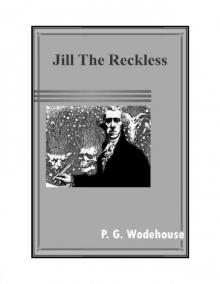 Jill the Reckless
Jill the Reckless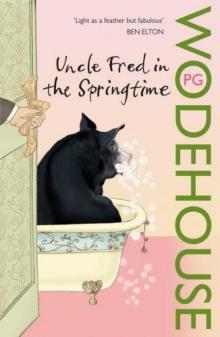 Uncle Fred in the Springtime
Uncle Fred in the Springtime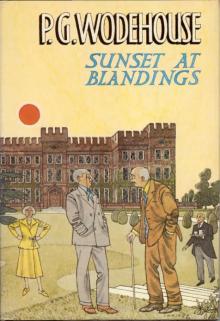 Sunset at Blandings
Sunset at Blandings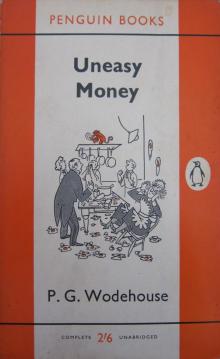 Uneasy Money
Uneasy Money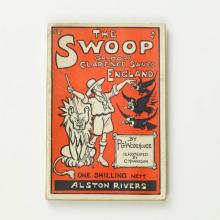 The Swoop! or, How Clarence Saved England: A Tale of the Great Invasion
The Swoop! or, How Clarence Saved England: A Tale of the Great Invasion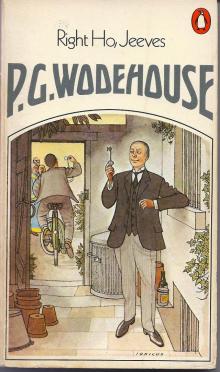 Right Ho, Jeeves
Right Ho, Jeeves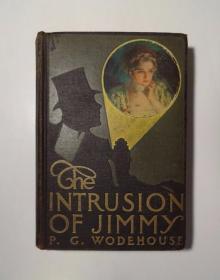 The Intrusion of Jimmy
The Intrusion of Jimmy The Jeeves Omnibus - Vol 1:
The Jeeves Omnibus - Vol 1: Aunts Aren't Gentlemen:
Aunts Aren't Gentlemen: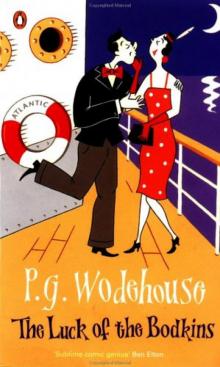 The Luck of the Bodkins
The Luck of the Bodkins The Little Nugget
The Little Nugget Money for Nothing
Money for Nothing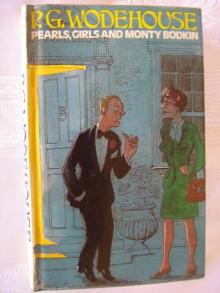 Pearls, Girls and Monty Bodkin
Pearls, Girls and Monty Bodkin Mulliner Nights
Mulliner Nights Blandings Castle and Elsewhere
Blandings Castle and Elsewhere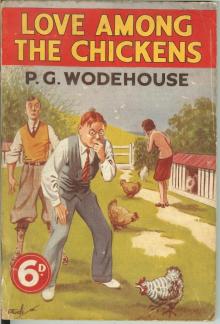 Love Among the Chickens
Love Among the Chickens Carry On, Jeeves!
Carry On, Jeeves!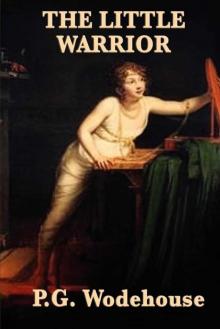 The Little Warrior
The Little Warrior Ice in the Bedroom
Ice in the Bedroom Leave It to Psmith
Leave It to Psmith Thank You, Jeeves:
Thank You, Jeeves: Money in the Bank
Money in the Bank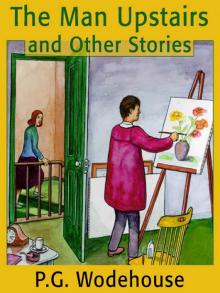 The Man Upstairs and Other Stories
The Man Upstairs and Other Stories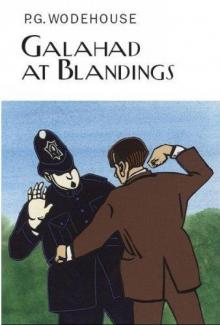 Galahad at Blandings
Galahad at Blandings The Jeeves Omnibus Vol. 5
The Jeeves Omnibus Vol. 5 Uncle Dynamite
Uncle Dynamite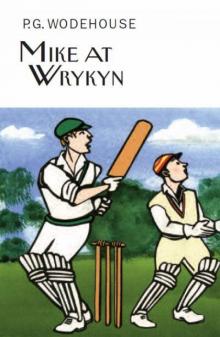 Mike at Wrykyn
Mike at Wrykyn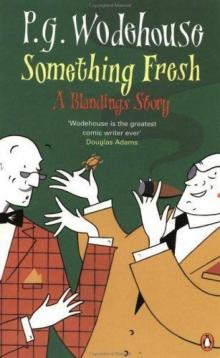 Something Fresh
Something Fresh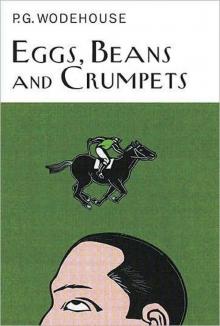 Eggs, Beans and Crumpets
Eggs, Beans and Crumpets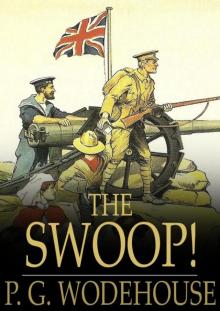 The Swoop: How Clarence Saved England (Forgotten Books)
The Swoop: How Clarence Saved England (Forgotten Books)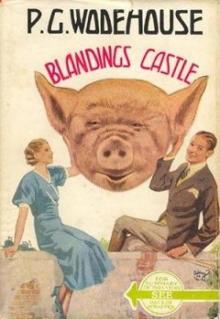 Blanding Castle Omnibus
Blanding Castle Omnibus Wodehouse at the Wicket: A Cricketing Anthology
Wodehouse at the Wicket: A Cricketing Anthology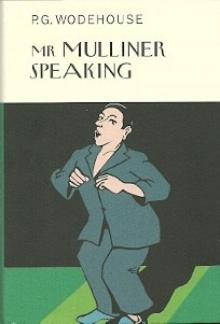 Mr. Mulliner Speaking
Mr. Mulliner Speaking Hot Water
Hot Water The Jeeves Omnibus - Vol 3: The Mating Season / Ring for Jeeves / Very Good, Jeeves
The Jeeves Omnibus - Vol 3: The Mating Season / Ring for Jeeves / Very Good, Jeeves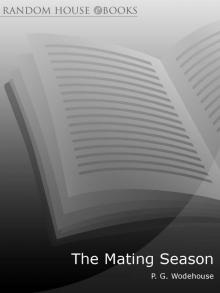 The Mating Season
The Mating Season Meet Mr. Mulliner
Meet Mr. Mulliner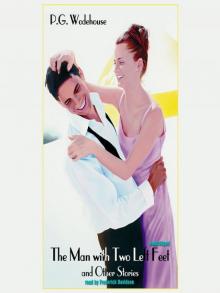 The Man with Two Left Feet, and Other Stories
The Man with Two Left Feet, and Other Stories Not George Washington — an Autobiographical Novel
Not George Washington — an Autobiographical Novel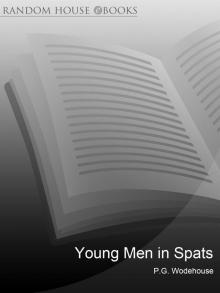 Young Men in Spats
Young Men in Spats The Jeeves Omnibus Vol. 4
The Jeeves Omnibus Vol. 4 A Pelican at Blandings:
A Pelican at Blandings: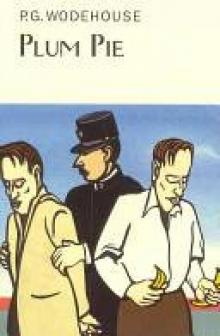 Plum Pie
Plum Pie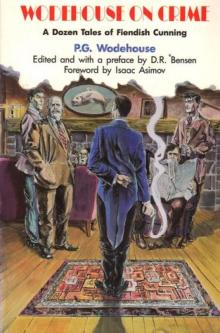 Wodehouse On Crime
Wodehouse On Crime The Jeeves Omnibus Vol. 2: Right Ho, Jeeves / Joy in the Morning / Carry On, Jeeves
The Jeeves Omnibus Vol. 2: Right Ho, Jeeves / Joy in the Morning / Carry On, Jeeves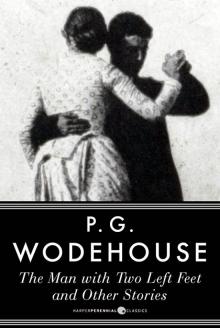 The Man With Two Left Feet
The Man With Two Left Feet Full Moon:
Full Moon: Jeeves and the Feudal Spirit:
Jeeves and the Feudal Spirit: Ring For Jeeves
Ring For Jeeves Something New
Something New The Girl on the Boat
The Girl on the Boat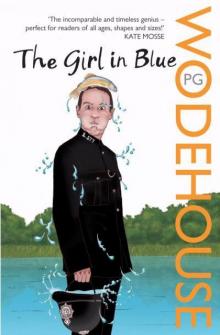 The Girl in Blue
The Girl in Blue Pigs Have Wings:
Pigs Have Wings: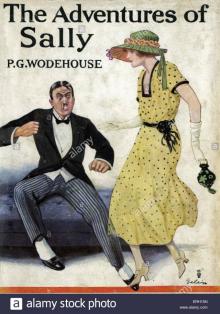 The Adventures of Sally
The Adventures of Sally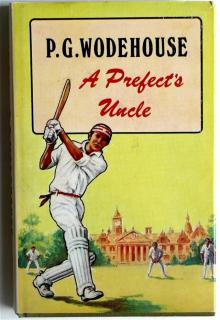 A Prefect's Uncle
A Prefect's Uncle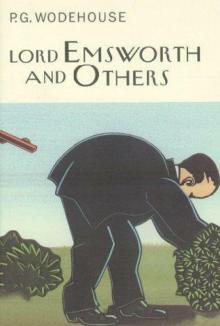 Lord Emsworth and Others
Lord Emsworth and Others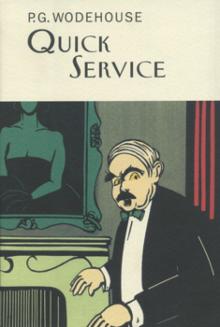 Quick Service
Quick Service The Prince and Betty
The Prince and Betty The Gem Collector
The Gem Collector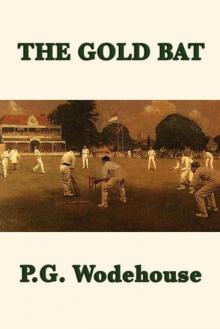 The Gold Bat
The Gold Bat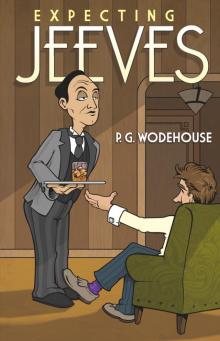 Expecting Jeeves
Expecting Jeeves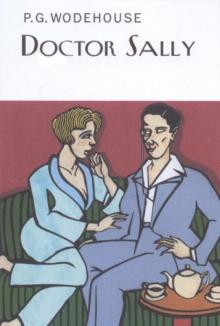 Doctor Sally
Doctor Sally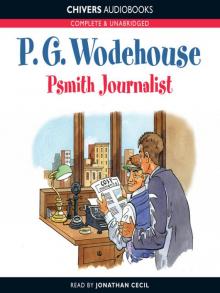 Psmith, Journalist
Psmith, Journalist The Golf Omnibus
The Golf Omnibus Heavy Weather
Heavy Weather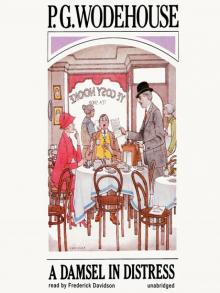 A Damsel in Distress
A Damsel in Distress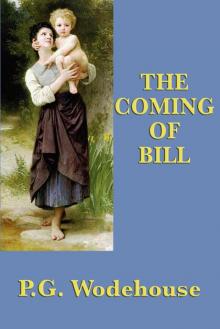 The Coming of Bill
The Coming of Bill Summer Lightning
Summer Lightning Piccadilly Jim
Piccadilly Jim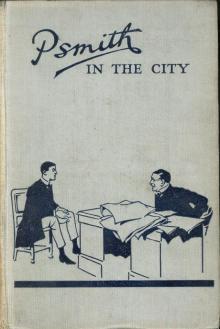 Psmith in the City
Psmith in the City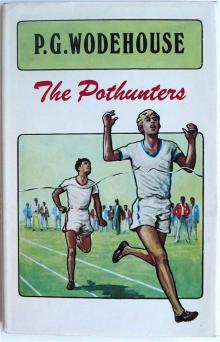 The Pothunters
The Pothunters Service With a Smile
Service With a Smile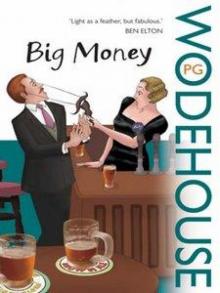 Big Money
Big Money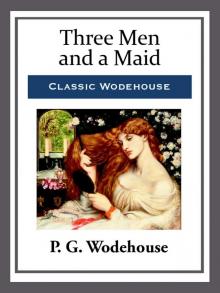 Three Men and a Maid
Three Men and a Maid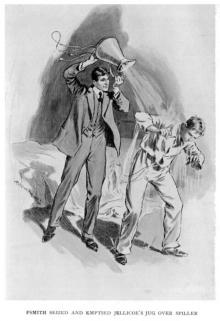 Mike and Psmith
Mike and Psmith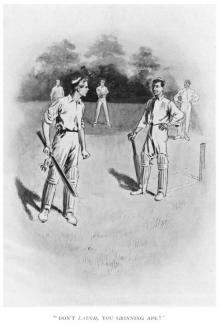 Mike
Mike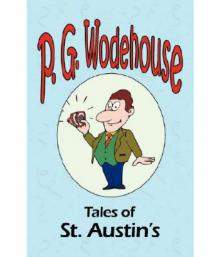 Tales of St. Austin's
Tales of St. Austin's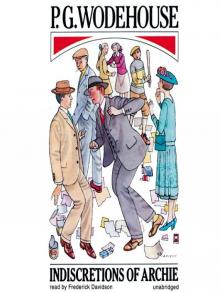 Indiscretions of Archie
Indiscretions of Archie Pigs Have Wings
Pigs Have Wings The Jeeves Omnibus - Vol 4: (Jeeves & Wooster): No.4
The Jeeves Omnibus - Vol 4: (Jeeves & Wooster): No.4 The White Feather
The White Feather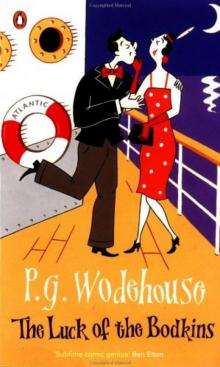 Luck of the Bodkins
Luck of the Bodkins THE SPRING SUIT
THE SPRING SUIT Full Moon
Full Moon Very Good, Jeeves
Very Good, Jeeves Thank You, Jeeves
Thank You, Jeeves Reginald's Record Knock.
Reginald's Record Knock. Wodehouse At the Wicket
Wodehouse At the Wicket LADIES AND GENTLEMEN V. PLAYERS
LADIES AND GENTLEMEN V. PLAYERS The Jeeves Omnibus - Vol 5: (Jeeves & Wooster)
The Jeeves Omnibus - Vol 5: (Jeeves & Wooster) The Jeeves Omnibus - Vol 1: (Jeeves & Wooster): No.1
The Jeeves Omnibus - Vol 1: (Jeeves & Wooster): No.1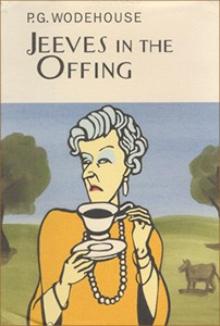 Jeeves in the offing jaw-12
Jeeves in the offing jaw-12